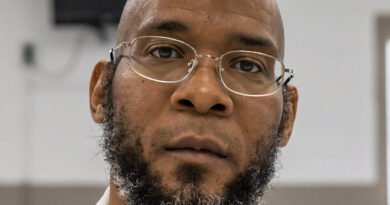Disgraced Defense Attorney Keegan Kelley and Her Client Turned Lover Allegedly Commits Triple Murder in Oklahoma City Oklahoma
Keegan Kelley Harroz was a rising star in Oklahoma City’s legal community. A graduate of Oklahoma City University School of Law, she began her career as an assistant public defender, earning praise for her courtroom acuity and dedication to indigent clients. In 2014, she founded her own criminal-defense practice, quickly building a reputation for tenacity and intelligence. Colleagues respected her analytical mind and commanding presence, and she was known to take on challenging cases with confidence. Outside the courthouse, Harroz was active in civic circles, volunteering for legal aid clinics and speaking at community events.
Barry Titus II’s History and Charges
Barry Ronald Titus II came into Harroz’s orbit in the fall of 2018. A former crane operator with a history of domestic violence allegations, Titus faced drug and firearm charges brought by his then–girlfriend, Tiffany Eichor. When Harroz agreed to defend him, it appeared to many as just another high-stakes case for her practice. But the attorney–client relationship soon crossed professional boundaries, and by late 2018 they were romantically involved. Titus’s own legal troubles—including convictions for unlawful possession of firearms as a prohibited person—resulted in short federal sentences in early 2021, but these pale in comparison to the gravity of the charges they would later face together.
Formation of a Dangerous Alliance
The bond between Harroz and Titus deepened alarmingly. Friends and former colleagues noticed a shift in Harroz’s judgment: once-meticulous preparations gave way to impulsive decisions, and her advocacy on other cases began to suffer. Titus, emboldened by his partner’s legal expertise, started to confide desperate plans to neutralize witnesses from his domestic-battery case. Harroz, torn between loyalty and her oath as an officer of the court, made choices that would shatter both her professional standing and multiple lives.
Early Warning Signs
In early 2019, concerns about Harroz’s conduct reached the Oklahoma Bar Association. A former romantic partner lodged complaints about her erratic behavior and troubling discussions of “handling” Eichor by unconventional means. Meanwhile, prosecutors handling Titus’s domestic battery case reported overhearing Harroz urge tactics that strayed beyond legal persuasion. Though no formal action was taken at the time, these warnings hinted at the depths of the conspiracy that would soon unfold.
The Victims: Tiffany Eichor and the Chandler Family
Tiffany Eichor was a 43-year-old mother working to move past a tumultuous relationship. After leaving Titus and reporting his violence, she sought a fresh start with her aging parents, Jack Chandler (65) and Evelynn “Kaye” Chandler (69), in their modest home in Beggs, Oklahoma. The Chandlers were pillars of their small community—devout churchgoers, generous hosts, and doting grandparents. Their open door and willingness to support Tiffany made them unwitting targets in Harroz and Titus’s lethal scheme.
Prelude to Violence: The Plot to Frame Eichor
Before the murders, Harroz allegedly orchestrated a plan to discredit Tiffany Eichor. In January 2019 she enlisted an associate to plant what was purported to be methamphetamine—actually powdered sugar—at the Chandler residence, hoping that a police raid would intimidate Eichor and derail her testimony. The plan was foiled when the Chandlers discovered the package, alerted authorities, and bolstered home security with cameras. Undeterred, Harroz and Titus escalated their tactics, moving from sabotage to outright murder.
Night of the Triple Homicide
In the early hours of September 7, 2019, Harroz and Titus drove from Oklahoma City to Beggs under cover of darkness. Surveillance footage later showed a vehicle matching Harroz’s 2010 Lexus SUV parked near the Chandler home around 3:00 AM. The pair cut power and phone lines to the house, plunging it into silence and preventing any calls for help. Using tools to breach the front door, they entered armed with multiple firearms. Jack Chandler was shot first in the living room; his wife, Kaye, was cornered and fatally wounded after hiding in a closet; and Tiffany was pursued into a hallway and shot at close range. The killings were execution-style, swift, and unrelenting.
Crime Scene and Forensic Evidence
When first responders arrived, the house was eerily dark. The power cut had also disabled the Chandlers’ alarm system. Inside, investigators found shell casings from both a high-powered rifle (later identified as an AR-15) and a semi-automatic handgun. Blood spatter patterns confirmed all three victims had been shot at extremely close range. A ball cap left at the scene bore Titus’s DNA. Nearby security footage captured a second vehicle—identified as belonging to Harroz—arriving and departing within a narrow timeframe. Ballistic testing matched shell casings to an AR-15 surrendered days later by Harroz’s brother, corroborating the use of weapons tied to the suspects.
Law Enforcement Response and Arrests
Whiteside County and federal agents quickly pieced together the evidence. Face recognition and license-plate readers tracked Harroz’s Lexus as it returned to Oklahoma City. After obtaining search warrants, police executed raids on both Harroz’s residence and Titus’s known addresses. Confronted with the forensic evidence, both suspects were taken into custody without incident. Habeas hearings followed, during which prosecutors announced their intent to pursue capital murder charges given the premeditated nature of the deaths and the number of victims.
Legal Proceedings and Capital Charges
By April 2021, Harroz and Titus were indicted on three counts of first-degree murder and one count of first-degree burglary. Prosecutors sought the death penalty, citing aggravating factors: the elimination of key witnesses, the vulnerability of the victims (two were senior citizens), and the professional betrayal by an attorney abusing her position. Both defendants pleaded not guilty, setting the stage for one of the most sensational capital cases in Oklahoma history. Pretrial motions—ranging from claims of prosecutorial misconduct to challenges over evidentiary rulings—filled the docket, further delaying the long-anticipated trial.
Psychological and Community Impact
The brutality of the murders sent shockwaves through Beggs and the broader Oklahoma legal community. Neighbors spoke of sleepless nights, fearful that no one was immune to such violence. Victim-impact statements poured into the court: Tiffany’s children mourned a mother lost, the Chandler grandchildren remembered their fun-loving grandparents, and friends lamented the shattering of a once-peaceful town. Legal colleagues of Harroz expressed disbelief, grappling with how a respected attorney could become complicit in such a heinous crime. Mental-health counselors offered free sessions to witnesses and first responders traumatized by the graphic scene.
Reflections on Professional Ethics and Betrayal
Harroz’s role as a licensed attorney magnified the sense of betrayal. Bar ethics experts lamented that her actions subverted the justice system she once served, eroding public trust. Law-school deans cited the case in lectures on professional responsibility, underscoring the critical distinction between zealous advocacy and criminality. Titus’s violation of trust as a client further highlighted the perils when personal relationships merge with legal strategy.
Legacy and Continuing Pursuit of Justice
As of mid-2025, the trial has yet to culminate in a verdict, but the death-penalty pursuit remains intact. Appeals and pretrial litigation continue to shape the case’s procedural landscape. Meanwhile, legislative committees have debated tighter oversight of attorney conduct, inspired by Harroz’s dramatic fall from grace. The Chandler family has established a memorial fund in honor of Jack and Kaye, supporting domestic-violence survivors and elder-care initiatives. Tiffany’s children, now under the guardianship of relatives, attend counseling and advocate alongside the memorial fund, determined that their mother’s legacy endure through service.
The September 7, 2019 triple homicide in Beggs, Oklahoma stands as a stark reminder of how calculated betrayal and unchecked desperation can culminate in tragedy. As Harroz and Titus await their day in court, the community continues to seek closure, justice, and healing.
Discover more from City Towner
Subscribe to get the latest posts sent to your email.




